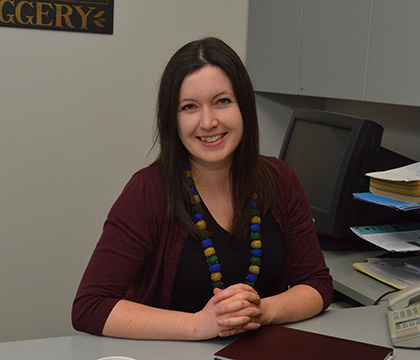
Pig proponent joins U of S
Early in her academic career Yolande Seddon realized she'd need to specialize if she wanted to make a difference.
By Jeanette NeufeldIn doing so, she chose an unconventional focus – the pig.
"The pig is a wonderful animal, very intelligent," says Seddon, a newly-appointed faculty member in the Department of Large Animal Clinical Sciences at the Western College of Veterinary Medicine (WCVM).
After completing her undergraduate and master's degree work in Britain and the Netherlands, Seddon spent time working as a stockperson on pig farms to increase her knowledge. She then focused on pig health management during her British Pig Executive-funded PhD program at Newcastle University, U.K.
"I've always been enthused by the challenges the pig industry faces," she says. "I could see early on that you're only going to have an impact if you understand the industry. There are a lot of constraints, a lot of factors that influence the way we do things in the industry. Unless you have a true knowledge of this, you won't be able to improve the situation."
In 2012 Seddon left the U.K. to begin her postdoctoral work as an animal ethologist at the Prairie Swine Centre (PSC). In the summer of 2015, Seddon was chosen to lead a unique partnership between the swine industry, PSC and the WCVM with the goal of securing significant matching funds to leverage industry money pledged for the development of a research program in swine welfare.
Now, as a WCVM faculty member, Seddon plans to devote the majority of her time to building a research program at the veterinary college in collaboration with the Prairie Swine Centre while teaching undergraduate and graduate students at the University of Saskatchewan (U of S).
The creation of this position is significant, representing a strategic investment by the Canadian swine industry to advance swine welfare knowledge. In developing a new research team, Seddon and her program will contribute new scientific findings on swine welfare that the industry can use to make informed decisions while taking leadership in this area.
Seddon says her research group's focus on swine welfare issues will help move the science forward on a global level and contribute to other research groups' efforts in helping to tackle some very complex concerns. With a passion for pigs, Seddon also intends to help train the next generation of scientific and industry professionals.
Seddon will continue her swine-focused research with the view to address welfare challenges and develop workable solutions with the industry. Ongoing projects include identifying pain behaviour in pigs, especially in relation to castrating male pigs, and investigating the influence of different stocking densities on the welfare and productivity of nursery pigs. Both initiatives could have an impact on Canada's future code of practice recommendations for swine care.
Seddon's appointment will benefit the university and the WCVM. In addition to promoting the areas of animal welfare and animal behaviour to students and the public, her research will build on work already being done by WCVM professor Joe Stookey, a specialist in cattle behaviour and welfare.
"These two complementary positions — one focused on swine and the other on cattle — will help build our capacity in the area of animal welfare and livestock production, which is a growing societal concern," says Dr. Murray Jelinski, acting head of the WCVM's Department of Large Animal Clinical Sciences.
"Their collaborative strength will also assist in attracting graduate students, who are critical to the success of research programs."
Seddon's background has helped to prepare her for the changing needs within the Canadian pork industry. In Europe, public pressure has already caused the industry to change its practices; the most notable changes relate to housing of gestating, or pregnant, sows.
Canada's industry has been under a lot of pressure to convert to group housing systems for gestating sows, and much of Seddon's work has been dedicated to understanding the implications on the pigs, and trying to determine what best practices will be moving forward.
She's excited about the swine industry's partnership in the project and its willingness to support a new research program.
Building solid relationships with industry is how the work will be implemented," she says.
Seddon believes the industry's participation will enable a proactive approach to welfare concerns. Industry investment also signals a willingness to work with researchers to "take the lead in improving pig welfare."
"Industry is prepared to go there and take a look at some of these challenging subjects. That's something very special," she says.
